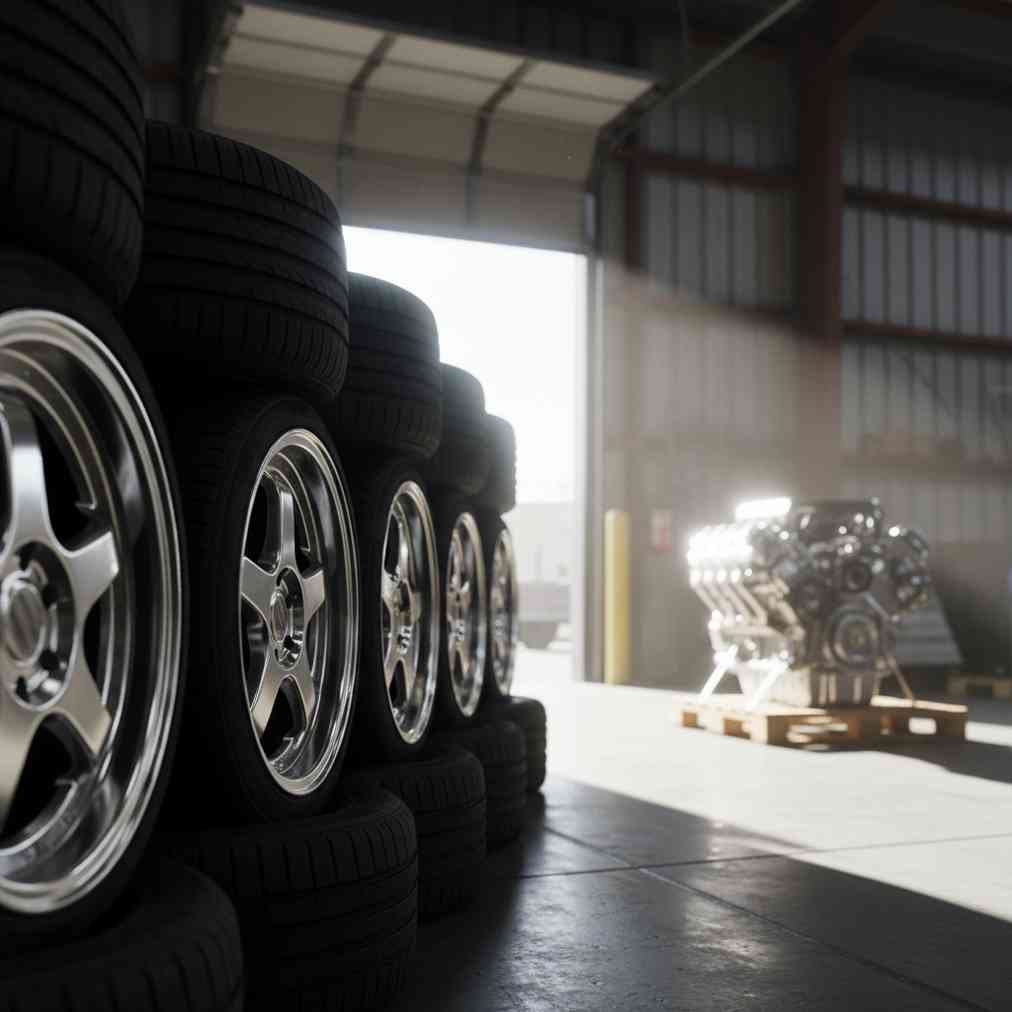Why Local Junkyards and Recycling Centers Are Essential to Your Community
Local auto salvage yards and recycling centers are vital small businesses that play a crucial, yet often underestimated, role in economic stability and environmental sustainability within a community. Supporting these centers directly encourages community recycling efforts and bolsters local economies.
These facilities serve as critical hubs in the circular economy by reusing automotive parts and various materials, which reduces landfill waste and conserves natural resources. They also generate substantial local employment and tax revenues, fostering small business development and community programs.
The Economic Impact of Local Recycling Centers
The numbers speak for themselves when it comes to the economic contributions of local junkyards and recycling centers. According to the Economic Impact Study U.S.-Based Recycled Materials Industry, the broader recycled materials industry contributes nearly $168.6 billion annually to the U.S. economy.
| Economic Metric | Value | Impact |
|---|---|---|
| Annual economic impact of scrap industry | ~$117 billion | National economic contribution |
| Jobs supported by recycling industry | 681,000 jobs | Direct employment opportunities |
| Wages generated by recycling | $37.8 billion | Annual worker compensation |
| Export-related jobs | 54,485 direct; 187,455 total | International trade support |
The U.S. scrap recycling industry generates approximately $117 billion annually, with about 40% from direct activities like selling salvaged auto parts and recycling metals. This economic activity keeps money circulating within local communities while providing essential services.
Environmental Benefits of Supporting Local Salvage Yards
Local auto recycling centers, often referred to as junkyards near me or salvage yards, provide essential environmental services that benefit both the community and broader ecosystems:
- Waste Reduction: Vehicles are often 85-90% recyclable when processed correctly, significantly reducing landfill waste
- Resource Conservation: Recycling automotive scrap metal (steel, aluminum, and copper) conserves natural resources
- Energy Savings: Using recycled materials reduces energy consumption compared to manufacturing new parts from virgin sources
- Emission Reduction: Retiring older, less efficient gas engines can eliminate significant pollution sources
- Hazardous Material Management: Proper disposal of used oil, antifreeze, brake fluids, and refrigerants prevents environmental contamination
“Junkyards are not mere waste dumps but critical components of sustainable resource use. They are living ecosystems that preserve assets, reduce environmental degradation, and provide affordable parts.”
Job Creation and Community Support
According to the EPA’s Recycling Economic Information Report, local salvage yards and recycling centers create jobs across various roles:
- Vehicle dismantling specialists
- Parts sales representatives
- Truck drivers and logistics coordinators
- Administrative and customer service staff
- Environmental compliance technicians
The recycling industry supports around 681,000 jobs and generates about $37.8 billion in wages annually across the United States. This employment directly benefits local communities by providing stable, well-paying jobs that can’t be outsourced.
How to Support Your Local Junkyard and Recycling Centers
Supporting these essential small businesses is straightforward and directly impacts community well-being. Here are practical ways you can make a difference:
1. Buy Used Parts Locally
When your vehicle needs a replacement part, prioritize searching local salvage yards over national chains or ordering new parts. Used auto parts can sell for, on average, 40% less than new auto parts, making them an affordable option while supporting local business. Whether you need fenders under $100 or used transmissions, local yards offer quality options.
2. Sell Your Unwanted Vehicle
Instead of letting an old, damaged, or unwanted car sit and degrade, consider getting an instant quote for your junk car. This ensures responsible disposal while putting cash in your pocket and supporting the local recycling ecosystem.
3. Choose OEM Parts from Local Sources
Local salvage yards often carry OEM car parts that maintain quality standards while offering significant savings. These parts are often superior to aftermarket alternatives and cost far less than new OEM parts from dealerships.
4. Spread Community Awareness
- Educate friends, family, and local mechanics about the value of auto recycling
- Share positive experiences with local centers on social media
- Recommend specific yards that provide excellent service
- Support community recycling programs and educational outreach
5. Patronize Environmentally Conscious Operations
Research and choose yards that emphasize responsible recycling and disposal practices. Look for facilities that:
- Properly handle hazardous materials
- Maintain environmental compliance certifications
- Use technology for inventory management and tracking
- Participate in industry best practices
Recent Industry Developments and Trends
The junkyard and recycling industry continues to evolve with new technologies and environmental challenges. According to industry analysis, several trends are shaping the sector:
Technology Adoption
The industry is increasingly adopting technology to streamline operations, including:
- Digital inventory systems for better parts tracking
- Electronic transaction records for improved efficiency
- Online platforms for parts searching and ordering
- Mobile apps for customer convenience
Electric Vehicle Integration
With the rise of electric vehicles, salvage yards are adapting to handle electric vehicle parts and the safe recycling of lithium-ion batteries. This represents a significant opportunity for local yards to expand their services and support the growing EV market.
Enhanced Safety and Compliance
Regulatory frameworks have grown more stringent, with scrap yards implementing:
- Advanced safety protocols
- Comprehensive reporting systems
- Environmental protection measures
- Anti-theft security systems
The Affordable Alternative: Cost Savings for Consumers
One of the most compelling reasons to support local junkyards is the significant cost savings they provide. With used auto parts often selling for 40% less than new parts, these facilities offer budget-friendly solutions for:
This cost-saving aspect is particularly beneficial for individuals on tight budgets, students, and anyone looking to maintain older vehicles cost-effectively.
Supporting the Circular Economy
When you support local junkyards and recycling centers, you’re participating in a circular economy model that maximizes resource utilization. Industry experts emphasize that these facilities are key players in extracting maximum value from end-of-life vehicles (ELVs).
Globally, nearly twenty-seven million vehicles are classified as salvage each year. Local salvage yards provide the infrastructure to process these vehicles responsibly, ensuring that valuable materials don’t end up in landfills where they could leach harmful chemicals into the environment.
Building Stronger Local Business Networks
Supporting local junkyards and recycling centers strengthens the entire local business ecosystem. Industry research shows that these businesses create ripple effects throughout the community by:
- Purchasing services from local contractors and suppliers
- Providing parts to local mechanics and repair shops
- Contributing to municipal tax revenues
- Supporting related industries like towing and transportation
The Future of Local Recycling Centers
As we look toward the future, local junkyards and recycling centers will continue to play increasingly important roles in sustainable transportation. With growing awareness of environmental issues and the economic benefits of recycling, these facilities are positioned to become even more valuable community assets.
The industry is adapting to new challenges, including processing electric truck parts and managing more complex vehicle technologies. This evolution ensures that local salvage yards will remain relevant and essential for years to come.
Taking Action: Your Role in Community Support
Supporting local junkyards and recycling centers is more than just a practical choice – it’s an investment in your community’s economic health and environmental future. By choosing to buy used parts locally, properly disposing of end-of-life vehicles, and spreading awareness about the benefits of automotive recycling, you’re contributing to a sustainable, circular economy that benefits everyone.
The next time you need auto parts or have a vehicle to dispose of, remember that your local junkyard isn’t just a business – it’s a vital community partner working to create jobs, protect the environment, and keep transportation affordable for everyone. According to economic impact research, every dollar spent on recycling generates additional economic activity throughout the community, making your support multiply its positive effects.
Start supporting your local junkyards and recycling centers today – your community, your wallet, and the environment will thank you for it.





Leave a Reply
You must be logged in to post a comment.